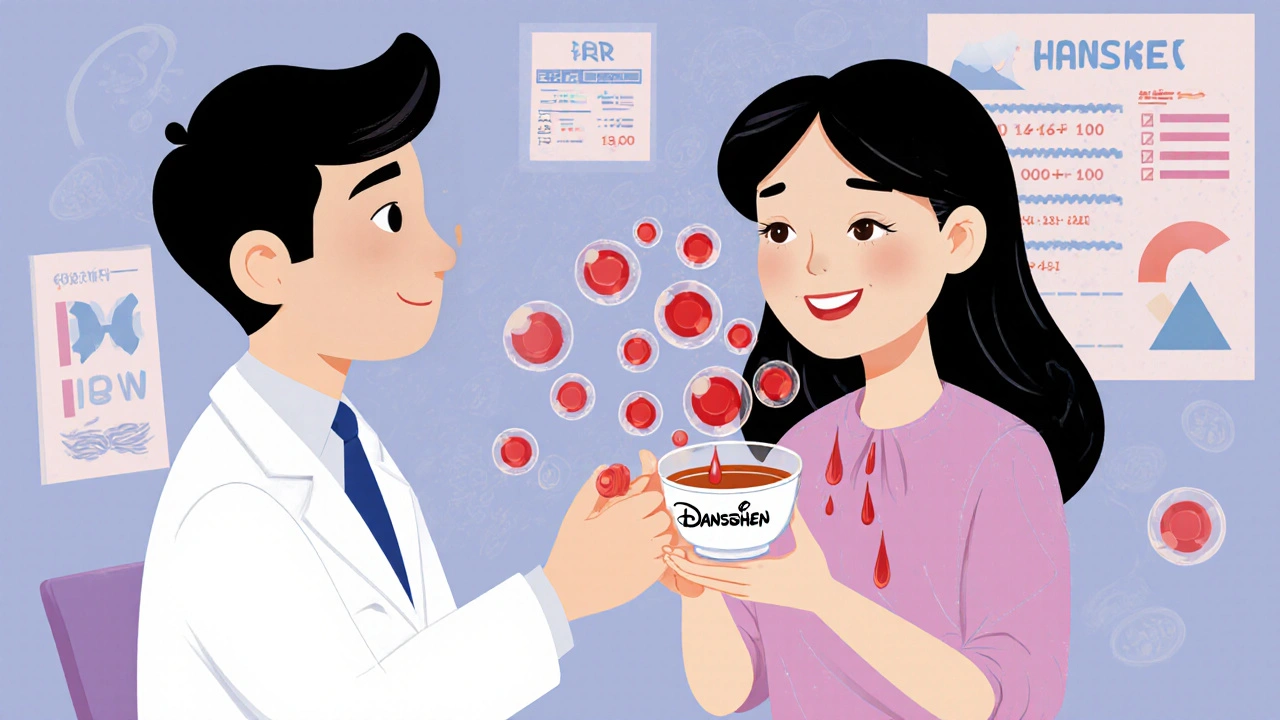Danshen and Heart Medications: Serious Interaction Risks

INR Interaction Risk Calculator
Check Your Risk
Enter your current INR value and whether you're taking Danshen. This tool estimates your bleeding risk based on medical guidelines.
Many people turn to herbal supplements like Danshen because they believe natural equals safe. But when it comes to heart medications, that belief can be deadly. Danshen, also known as red sage or Chinese sage, is a traditional herb used for centuries in Asia to support heart health. Today, it’s sold in health food stores, online, and even in some pharmacies as a supplement. But if you’re taking blood thinners, beta-blockers, or any heart medication, Danshen could be silently increasing your risk of serious bleeding - even death.
What Is Danshen, Really?
Danshen comes from the root of Salvia miltiorrhiza, a plant used in Traditional Chinese Medicine since at least 200 BCE. It’s not just a folk remedy - it’s been studied in hospitals in China for decades. In fact, the Chinese government approved Danshen injections in 1993 and compound dripping pills in 1995 for treating heart attacks and angina. But in the U.S. and Europe, it’s sold as a dietary supplement, meaning it’s not held to the same standards as prescription drugs.
What makes Danshen dangerous isn’t just that it works - it’s that it works unpredictably. The active compounds, like tanshinones and salvianolic acids, can thin your blood, lower your blood pressure, and open up your coronary arteries. That sounds helpful, right? But here’s the catch: those same effects can turn deadly when mixed with heart medications.
Why Danshen and Blood Thinners Are a Dangerous Mix
If you’re on warfarin (Coumadin), rivaroxaban (Xarelto), apixaban (Eliquis), or any other anticoagulant, Danshen can push your blood-thinning effect into a life-threatening zone.
Warfarin requires careful dosing and regular blood tests (INR) to keep your clotting level in a safe range - usually between 2.0 and 3.0. But Danshen doesn’t play by those rules. It blocks the liver enzymes that break down warfarin, causing the drug to build up in your body. In documented cases, patients taking Danshen while on warfarin saw their INR spike from a safe 2.5 to over 8.4 - more than triple the upper limit. That’s not a lab anomaly. That’s a real person bleeding internally, needing emergency transfusions, and almost dying.
It’s not just warfarin. Newer blood thinners like rivaroxaban are also at risk. Studies show Danshen inhibits the same liver enzymes (CYP3A4 and CYP2C9) that process these drugs. That means your body can’t clear them properly. The result? Higher drug levels in your blood, longer clotting time, and a much higher chance of bleeding in your brain, stomach, or elsewhere.
There’s no antidote for Danshen. If you bleed because of warfarin, doctors can give you vitamin K or fresh plasma. If you bleed because of rivaroxaban, there’s an antidote called andexanet alfa. But if Danshen is the culprit? There’s nothing. You’re at the mercy of your body’s ability to stop the bleeding - and that’s not always enough.
Real Cases, Real Consequences
This isn’t theoretical. Medical journals are full of horror stories.
- A 62-year-old man with a mechanical heart valve took Danshen for two weeks. His INR jumped from 2.8 to over 8.4. He lost nearly half his blood volume and needed a transfusion.
- A 48-year-old woman on warfarin for atrial fibrillation started taking Danshen every other day. Her INR climbed to 5.6. She had to stop the supplement and spend weeks getting her levels back to normal.
- A 66-year-old man with a stomach tumor was stabilized on warfarin for a year. After taking Danshen for just three days, his INR hit 5.5. He bled severely and almost died.
A 2020 study in Taiwan tracked 17 more cases over just four years - all patients on blood thinners who started Danshen. Their INR levels jumped from an average of 2.3 to 5.8. That’s a 150% increase in bleeding risk.
And these aren’t rare outliers. Reddit threads from people on anticoagulants are full of similar stories: “My INR went from 2.5 to 6.0 after my TCM practitioner gave me Danshen.” “ER visit after taking Danshen with Eliquis - never again.”

Why People Don’t Realize the Risk
Most people don’t tell their doctors they’re taking herbs. A 2019 study in JAMA Internal Medicine found only 28% of patients who used herbal supplements mentioned it to their physician. Why? They think it’s harmless. They’re afraid their doctor will judge them. Or they assume their doctor knows everything about supplements - which most don’t.
It’s worse among older adults and immigrants from Asia, where Danshen is culturally accepted. One 2021 survey found 41.7% of Chinese immigrants in the U.S. took Danshen regularly - but only 32.4% told their doctor. That’s a massive gap between what people believe and what’s medically safe.
And here’s the kicker: Danshen supplements vary wildly. One bottle might have 0.05% tanshinone. Another might have 5.2%. That’s a 100-fold difference in potency. You can’t know what you’re getting. There’s no standardization. No labeling requirements. No way to measure the dose.
What Your Doctor Should Be Asking
Doctors aren’t mind readers. If you’re on heart medication, you need to volunteer this information - no matter how “natural” or “harmless” it seems.
Ask yourself:
- Have I told my doctor about every supplement, tea, or herb I take?
- Do I know what’s in my Danshen product? Is it even the same brand every time?
- Has my INR been checked recently - and was I taking Danshen when it was drawn?
The American Heart Association and the National Center for Complementary and Integrative Health both recommend asking patients directly: “Do you take any herbs, vitamins, or supplements?” Not “Do you take anything else?” - because people hear “anything else” and think “medicines.” They don’t think of tea or capsules as drugs.

What to Do If You’re Already Taking Danshen
If you’re on a blood thinner and currently taking Danshen - stop. Immediately. Don’t wait. Don’t taper. Just stop.
Call your doctor or pharmacist. Tell them exactly what you took, how much, and for how long. They may need to check your INR or run other blood tests. If you’re on rivaroxaban or another newer anticoagulant, they’ll monitor you closely for signs of bleeding: unusual bruising, nosebleeds, dark stools, red or pink urine, or sudden headaches.
If you’re considering Danshen for heart health, talk to your cardiologist first. There are safer, proven ways to support your heart: exercise, a Mediterranean diet, quitting smoking, and taking prescribed medications as directed. No supplement replaces that.
The Bigger Picture: Natural Doesn’t Mean Safe
The global Danshen market is projected to hit $1.84 billion by 2027. People are buying it because they’re desperate - for alternatives, for control, for hope. But hope without science is dangerous.
The FDA has issued warnings about unapproved Danshen products. The European Medicines Agency requires warning labels on Danshen supplements sold in Europe. The American College of Cardiology now recommends screening all patients on anticoagulants - especially those of Asian descent - for Danshen use.
Herbs aren’t the enemy. But when they interact with life-saving medications, they become silent killers. And unlike pharmaceuticals, they don’t come with warnings you can’t ignore.
When it comes to your heart, don’t gamble with herbs. Your life isn’t a trial.
Can I take Danshen if I’m not on blood thinners?
Even if you’re not on blood thinners, Danshen can still lower your blood pressure and affect heart rhythm. If you have heart disease, kidney problems, or are pregnant, it could cause complications. Always talk to your doctor before starting any new supplement - even if you think it’s safe.
Is there a safe dose of Danshen for heart patients?
No. There is no scientifically established safe dose of Danshen for people taking heart medications. The potency varies wildly between brands, and its effects are unpredictable. Even small amounts can interfere with blood thinners. Experts recommend avoiding it entirely if you’re on any cardiac drug.
What are the signs of Danshen-related bleeding?
Watch for unexplained bruising, nosebleeds that won’t stop, blood in urine or stool, vomiting blood, or sudden severe headaches. These could signal internal bleeding. If you’re taking Danshen and notice any of these, stop immediately and seek emergency care.
Does Danshen interact with other heart meds besides blood thinners?
Yes. Danshen can lower blood pressure, so combining it with beta-blockers, ACE inhibitors, or diuretics might cause your blood pressure to drop too low. It may also interfere with calcium channel blockers and antiarrhythmics. The exact interactions aren’t fully mapped, but the risk is real.
Are there safer herbal alternatives to Danshen for heart health?
There’s no herbal substitute that’s proven safe and effective for heart patients on medication. Instead, focus on evidence-based approaches: regular physical activity, reducing sodium, eating more vegetables and omega-3s, managing stress, and taking prescribed medications as directed. These are proven to improve heart outcomes without hidden risks.

Man, I never thought about how 'natural' could be so dangerous. I had a buddy take Danshen for his cholesterol after reading some blog post. He ended up in the ER with a GI bleed. Turns out he was on warfarin and never told his doctor. It’s wild how we treat herbs like candy. I mean, if it changes your blood chemistry, it’s a drug - regardless of what the bottle says.
Y’all are overreacting. Danshen’s been used for 2000 years - you think modern medicine knows everything? I’ve seen Chinese grandmas take it daily and live to 95. The real issue is Big Pharma trying to scare people away from cheap alternatives. If you’re on blood thinners, sure, talk to your doc - but don’t throw out tradition because some lab report says so.
Okay but let’s be real - if you’re taking Danshen and you’re not Chinese or you don’t have a TCM practitioner in your basement, you’re just doing a very expensive placebo with side effects. Also, why does everyone assume 'natural' = good? Plants evolved to poison you. That’s how they survive. So yeah, your 'herbal heart tonic' is literally a chemical weapon your body didn’t ask for.
The data is unequivocal. CYP3A4/CYP2C9 inhibition mediated by tanshinones induces pharmacokinetic drug-drug interactions with anticoagulants, elevating INR beyond therapeutic thresholds. The absence of standardized phytochemical quantification renders dosing unpredictable - a critical failure in risk-benefit calculus. Regulatory arbitrage via dietary supplement loopholes enables systemic harm. This is not 'alternative medicine.' It's medical negligence enabled by consumer ignorance.
Look, I get it - you wanna be 'holistic.' But if you’re American and you’re popping some Chinese herb you bought off Amazon because some influencer said it 'cleanses your chi,' you’re just being dumb. We have science. We have trials. We have FDA warnings. Stop playing Russian roulette with your heart because you think 'ancient wisdom' beats peer-reviewed research. This isn’t culture - it’s a death wish.
STOP TAKING DANSHEN!!! 🚨🩸 My uncle died from a brain bleed after taking it with Eliquis. He thought it was 'just tea.' He wasn't even 60. I swear to god if you're on blood thinners and you're even THINKING about Danshen - just delete the website. 💔😭
why do people think herbs are safe? like bro its a plant. it dont come with a warning label like tylenol. i took danshen for a month and my gums bled every time i brushed. i thought it was gingivitis. turns out it was the herb. my doc was pissed. i felt dumb. dont be dumb.
My mom’s on a beta-blocker and she swears by Danshen because her friend’s cousin in Taiwan said it helped her palpitations. I told her it could drop her BP too far. She said 'but it’s natural!' I’m just gonna keep checking her vitals every week. I don’t want to lose her because someone sold her a bottle labeled 'heart harmony' with no ingredients listed.
Let me just say - this isn't 'alternative medicine.' This is 'unregulated, untested, unmonitored, unaccountable chemical chaos' masquerading as wellness. The fact that this stuff is sold in gas stations next to energy drinks and protein bars is a national disgrace. The FDA is asleep at the wheel. And the public? They’re too busy scrolling TikTok to read the small print. Wake up. People are dying.
I think the real tragedy here isn’t just the interaction - it’s how we’ve detached from the idea that healing is complex. We want a pill, a tea, a capsule - something we can swallow and feel like we’ve 'fixed' ourselves. But the heart isn’t a broken machine you can tweak with a root. It’s a system. And when you interfere with it without understanding the whole network, you don’t get healing. You get chaos. And sometimes, death.
Let’s be clear: Danshen’s CYP3A4 inhibition is well-documented in pharmacokinetic studies. The 2020 Taiwan cohort showed a 150% spike in INR elevation - that’s not anecdotal, that’s clinical. And the lack of batch standardization? That’s a regulatory failure on a global scale. We need mandatory phytochemical labeling, third-party verification, and mandatory physician disclosure protocols. This isn’t about fear - it’s about accountability.
I just wanted to say thank you for writing this. My grandma took Danshen for years and never told anyone. She’s fine now, but I’m so glad I read this before I started anything myself. Sometimes it’s better to just stick with what’s proven. 🌿❤️
Hey, if you’re taking Danshen - stop. Just stop. I get it, you want to feel in control. But your heart doesn’t care if it’s 'natural' - it just cares if your blood is thinning too much. Talk to your doc. Get your INR checked. Replace the herb with a walk. Your body will thank you. You got this 💪❤️
Actually, Brad - I get where you’re coming from. My grandmother used Danshen tea too. But here’s the thing: she never mixed it with warfarin. She was 87, not on meds, and drank it as a ritual. The problem isn’t tradition - it’s the modern fusion of ancient herbs with modern pharmaceuticals without oversight. That’s the real danger. We’re blending systems that never evolved to coexist.